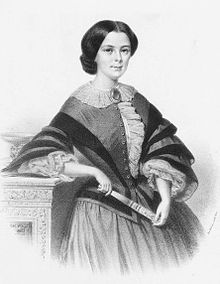Caroline Lefebvre
Constance-Caroline Lefebvre, sometimes spelled Lefèvre, (born 21 December 1828 in Paris, France; died 1905) was a French mezzo-soprano and soprano opera singer who started her career in 1849 and retired in 1866, mostly playing "dugazon" roles.
[citation needed] Lefebvre debuted at the Opéra-Comique on 12 October 1849 as Carlo Broschi in La part du diable by Daniel Auber.
[1] Her following roles were often labeled as mezzo-soprano "dugazon" roles, including Le Toréador et Le Postillon de Lonjumeau by Adolphe Adam (Madeleine); Joconde and Jeannot et Colin by Nicolas Isouard (Jeannette); Joseph en Égypte by Étienne Méhul (Benjamin); Le Pré-aux-clercs by Ferdinand Hérold (Isabelle); Le Petit Chaperon rouge by François-Adrien Boieldieu (Rose d'amour); L'Épreuve villageoise (Denise) by André Grétry; Fra Diavolo (Zerline), La Sirène and Haydée by Daniel Auber; and especially Fromental Halévy's operas, Les Mousquetaires de la reine (Berthe de Simiane), La Dame de pique, Le Val d'Andorre, and La Fée aux roses.
In 1850, she created Palomita in La Chanteuse voilée by Victor Massé and another role in Les Porcherons by Albert Grisar; in 1852, she created La Croix de Marie by Louis-Aimé Maillard and Madelon by François Bazin, followed by the titular role in Colette by Justin Cadaux in 1853.
In 1854, she created Prascovia in L'Étoile du Nord by Giacomo Meyerbeer and then Massé's Miss Fauvette, Grisar's Le Chien du jardinier, and Rosette in Adam's Le Housard de Berchini in 1855.
